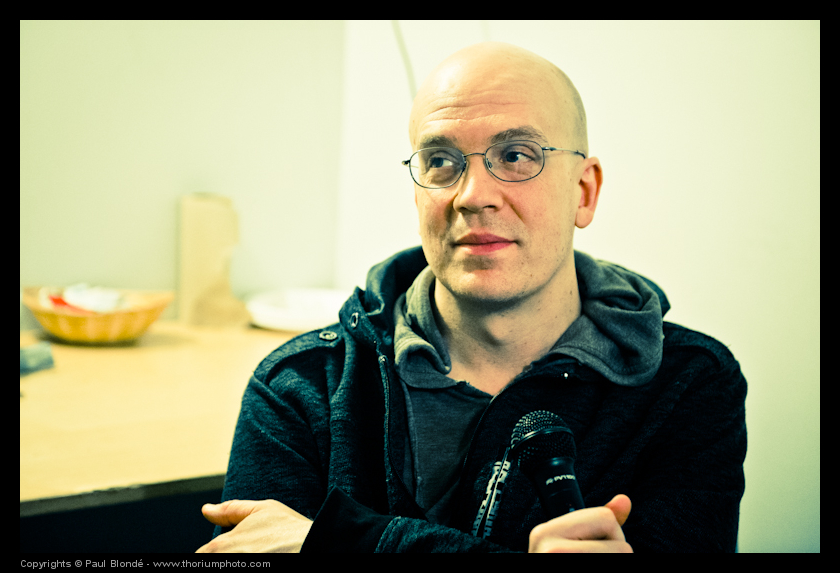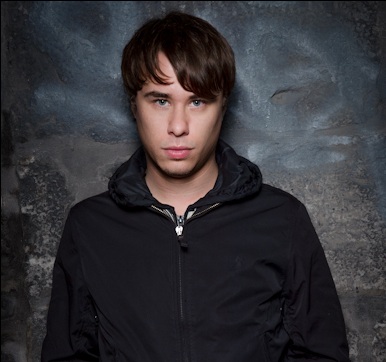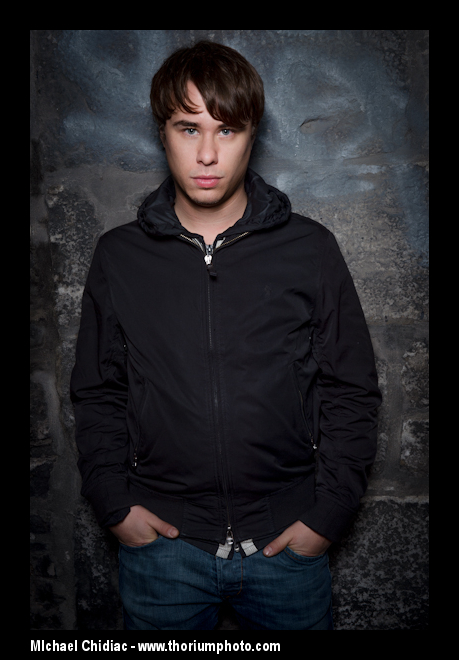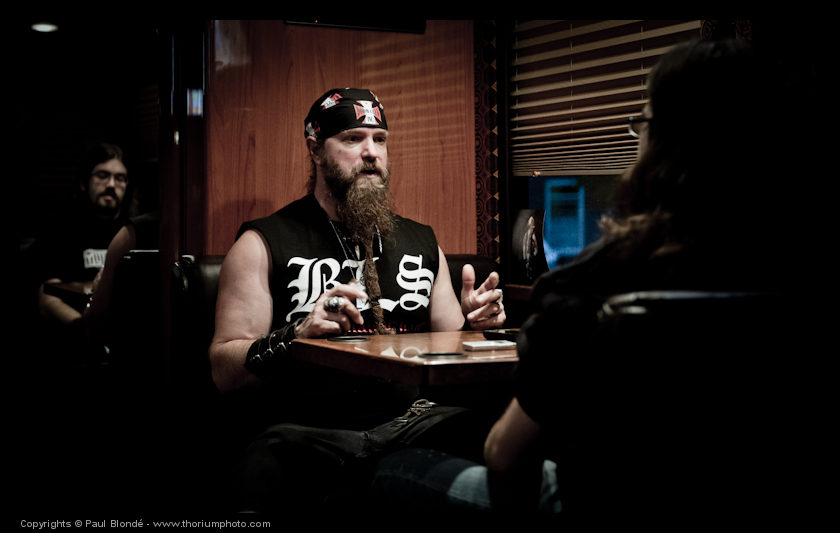Interview : Mathias “Vreth” Lillmåns (Finntroll)
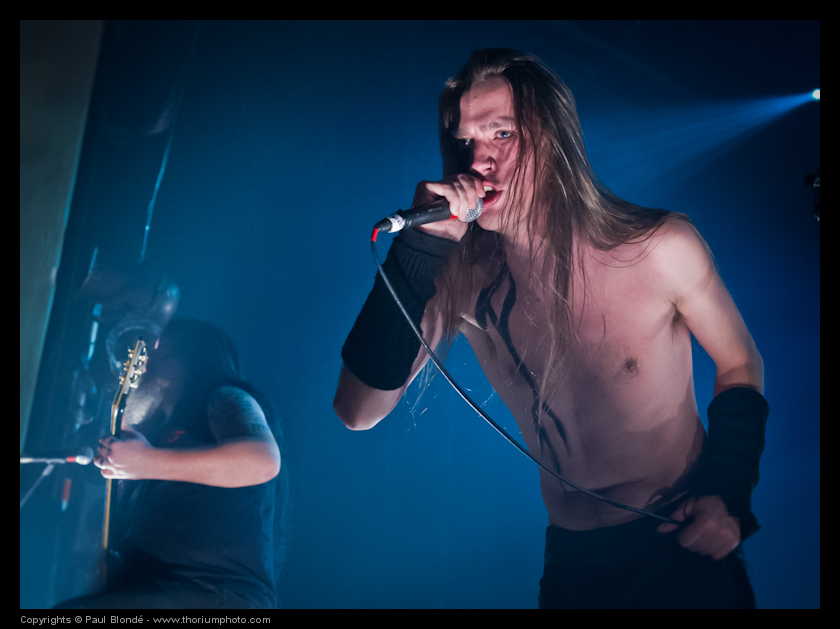
Thorium a eu la chance de s’entretenir avec Vreth, chanteur pour le groupe finlandais Finntroll, à l’occasion de la sortie de leur prochain album. Au menu, les nouveaux morceaux, l’inévitable tournée en Amérique du Nord – et bien sûr un arrêt obligatoire à Montréal – les influences musicales qui l’ont touché, et une petite touche de discussion religieuse.
Thorium – You have a new album, Blodsvept, coming out soon. What are the lyrical themes we can expect on it?
Vreth – Last time around, every song had it’s own story it’s own legend. Last time, every song had it’s own story, based on urban legends. This time, it’s sort of the same thing, but some of the songs are connected lyrically and others are off the concept. It’s about humanity against nature and how people come and fuck everything up. It’s one of the most accomplished lyrical works we’ve done so far.
T- How did the composition and recording of the album go?
V- It was probably the hardest album that any of us had to do. We had problems from the beginning, went back and forth on songs rearranging, adding and removing riffs, and we were far into the process when we found the sound we wanted to do and everything started to solve itself… until we went into the studio and started having huge technical problems. At some point, we lost eight guitar tracks. We mixed the album three times, and we ended up doing the final mix in 20 hours, in one sitting, after 14 or 15 hours in the studio every day.
T- Blodsvept gives out a groovier, less agressive sound. How did that sound come around?
V- That is the sound we were aiming for when we started writing the songs. In the beginning, none of us were satisfied with the material we had, because it was closer to Nifelvind. It sounded like Nifelvind part two or something like that. We came to the conclusion that we had added too much stuff. The last album was full of small details and we had recorded lots and lots of tracks. This time, we actually decided to strip it down, and just put the basic melodies out there and take away the small details. There still is some detail in there, but it makes it heavier, more raw. The guitar sounds more crushing this time.
T- Have you played the new material live yet?
V- Yes, we played two of them a couple of weeks ago in Estonia. and played one of them in our shows in Europe last year.
T- How did the crowd react to the new material?
V- It’s been really great. we couldn’t hope for it to be better. We weren’t concerned about people liking it – it’s just another Finntroll album after all. In the beginning people were standing back but they got into it, and the second time around, they would go “Yes! This is fucking cool!” We’re really happy about how the crowd reacted.
T- Did you have any particular infuences for the album?
V- For this weird reason, we started working with brass instruments a lot, and because of that we have this influence from big band music this time around. It wasn’t supposed to be that much in the beginning, but at some point we decided inviting a brass section and adding a few tracks of that. It’s been the biggest influence on our writing for Blodsvept.
T- What kept Finntroll out of the studio for three years?
V- Touring, touring, touring! We played so many shows in the first one and a half year after Nifelvind, over two hundred. We’re not twenty anymore, so everybody was needing a break from all this touring. After some time, we started to want to get back out there and started doing the album, and promotional stuff, and there we are. We’re really excited to start touring again.
T- Talking about touring, we didn’t see you here in North America for a little while. Do you expect to tour on this side of the ocean soon in support of the new album?
V- Yes! Definitely! I think I can’t talk about the dates yet, but it is in the works, there are north american dates for this year. We’re coming back!
T- You’ve been to Montreal a few times with the band, what’s your opinion of the city?
V- I love Montreal, it’s one of my favorite places to play! Usually, when you come to Montreal you’ve played some crappy north american cities in front of 120 people in the middle of nowhere, and there you have two thousand people going crazy! I also really like the city in itself, if we could we’d take a day off in Montreal, if it wasn’t so expensive paying for the tour bus and everything.
T- You’ve been for the band for a while. What brought you to the band in 2006?
V- Actually it was sort of a coincidence. I was in a Finn school studying with Katla, the first singer of the band. At the time when they kicked Tapio Wilska out, they asked the first singer if he knew anyone since we went together to a small swedish-speaking school. The new guy had to speak swedish and be a good singer. He pointed them to me, I gave them a few of my old CD’s, I got to try out and got the job. It was quite painless.
T- As a vocalist, what are your influences?
V- I’ve had a lot of musical influences in my time. In the ’90’s, when I started in this kind of music, I was practicing a more high-pitched scream, Grutle Kjellson, from Enslaved, has been a really big influence for me in that style. And later on, I started listening to Behemoth, and Nergal has been a big influence, closer to what I do now. Those two are the most important to me.
T- You’ve gone from black metal to the folk metal that you play now, which is almost party music. Has the transition been hard?
V- I never really listen to folk metal. I’ve never really caught that train. I never would have joined Finntroll if it was “only a folk metal band”. I want to be proud of what I do, and proud to sign my name under the songs. The band has folk influences, and it’s not really folk metal. They also have black metal influences. I really like how you don’t have any barriers in Finntroll and you can play what you want to play. That’s one of the reasons I really wanted to join the band.
T- There have been quite a few lineup changes in Finntroll since the band’s beginning. What was your input when you joined?
V- When I joined, I sort of brought a more brutal sound to Finntroll. I am also involved in a lot of the songwriting so of course that shows a little bit. I’m all into that kind of making it raw, heavy and brutal.
T- The name, Finntroll, is based on the legend of a man with a beastly appearance hunting Christians. Do you have a particular outlook on religion?
V- I’ve never been a religious guy, never believed in anything. You could say I’m anti-christian. I have always had harsh thoughts toward religion and always will.
T- Summer is the big festival period of the year. Do you have any big expectations this year?
V- I’m looking forward touring and playing a different concept, with the album release tour to do. Bigger cities, fewer bands, they’re going to be very special shows. We’ll put more money into them and hopefully the people will come out. It’s going to be really cool. we switched european booking agents this year and the new guy has brought new connections for festivals we have never played. I’m really looking forward to see how this turns out.
T- There’s been a big fandom developing around folk metal in North America, and there’s been a lot of tours built around the genre. What’s your take on the boom of the viewership in the genre?
V- As I said for many years, this folk, viking and pagan metal is sort of a trend. It caught on early in Europe and is past it’s peak. It’s been in decline and you can’t get as much people out. Record sales are going down, but it keeps up in America. I guess we have a good two or three years before it reaches it’s peak over there. I guess we should be glad having the chance to play North America instead of going to the same places and getting less and less people.
T- What can we expect for the band in the future?
V- We’re gonna tour and be really out there for the next two years, that’s what to expect. We’ll be promoting the album and we’ll keep going for at least a year and a half.
T- We can expect the same tend than last time, then – Touring for two years, a little break and the next album in three?
V- That’s sort of what we do. Two years on the road, then it’s a break and taking time to write the new stuff.
T- Thank you for your time, and we’ll be expecting you in Montreal this year, maybe have a beer!
V- We’ll definitely going to be there… And I’m always up for beer! Cheers!
httpv://youtu.be/7K_J6cZEfXM
Auteur : Phil Mandeville
Photographe : Paul Blondé (archives Thorium)
Pour en savoir plus : Finntroll












